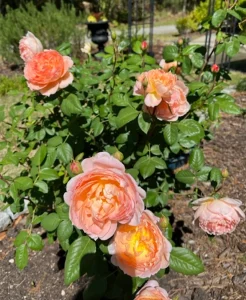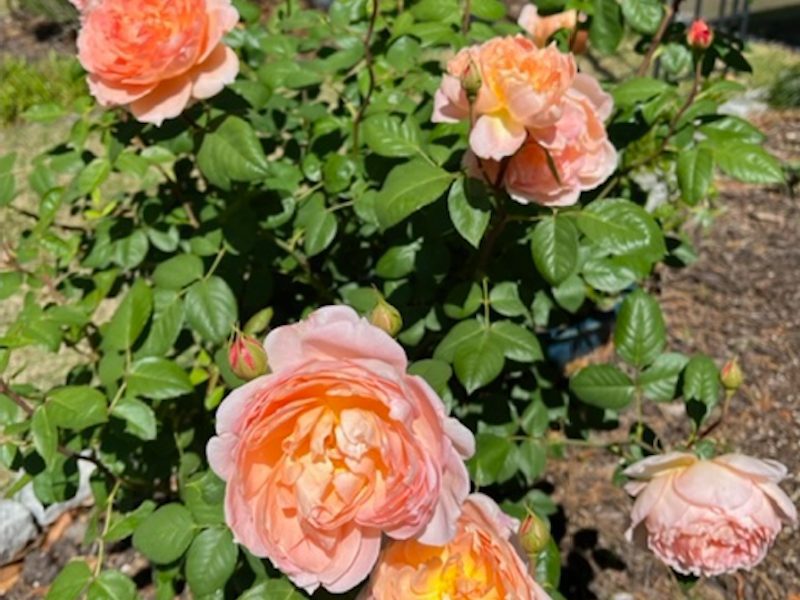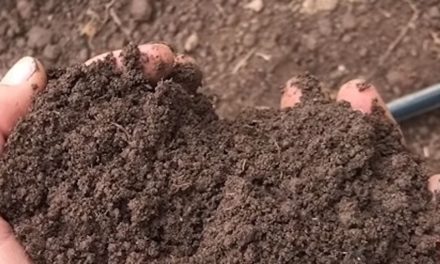
David Austin rose blooming on March 20th, 2023. It seems to have loved the cold weather.
It is not easy to do spring gardening when it is 82 degrees one day and 25 the very next night. Such has been our fate this winter and spring. If you have, like me, had quite few things “nipped” by the recent freeze, fear not. Chances are they will come back. Even some of my toughest plants were affected by this topsy turvy weather. If we were confused by going from shorts and T shirts to a sweater, think of how our shrubs and perennials felt!
Our traditional last frost date is March 15th. Last year we had a frost on March 14th after a very mild winter, so who knows? It nipped many of my emerging perennials. Thankfully the damage was not permanent. Having in no way learned my lesson, I have been busily planting things this year before our last frost date, but I am prepared to cover them if it gets nippy once again.
Evening temperatures are the key to plan growth. Once the night temps are consistently above 50 degrees or above we have reached favorable growing conditions. Now is a very good time to amend your soil. I add mushroom compost or composted cow manure available at most garden centers. Using compost is much more sustainable than adding fertilizer and much less expensive. I spread the compost on top of the soil. Plant scientists have dismissed the old practice of deep digging or turning the soil over as destructive to the soil structure. It also can destroy the micro organisms living in the soil. These micro-organisms including Micorrhizal fungus help plants to take in beneficial nutrients and flourish.
It is also a good time to prune those winter damaged shrubs if you have not already done so. Bottlebrushes can be a particular problem. Native to Australia, these shrubs will take a frost, but 18 degrees was just too low for these heat–loving plants. All the leaves will fall off and you can cut the branches down by one – third. I noticed that my Bottlebrushes “told” me which branches to trim. There were frost splits from the freeze on some branches and I judiciously pruned them. It may take awhile, but Bottlebrushes will re–sprout and leaves will appear. Mine are sprouting new leaves right now. With all of your freeze damaged plants, patience is needed. Do not give up on something. My Meyer Lemon looked totally deceased, but it now has all shiny new leaves.
At the end of March, you can plant annuals seeds such as cosmos, cleome, tithonia (Mexican sunflower), marigolds, and zinnias. Tropicals can be set outside the house for a little vacation if they have spent winter indoors.
You will probably buy your annuals and perennials at a local nursery or garden center. It is important to check plant labels before you purchase a new baby to take home. Full sun is 6 plus hours. Part shade plants will melt in our hot sun. Many plants are now being labeled with a heat and cold index. Our heat zone is 9A while our cold zone is 8B. Zones are changing due to climate change and our springs seem to be getting earlier and earlier. Pollen in February? Not fair.
Knowing the native origin of a plant can be very helpful to know if it will grow down here. If it is native to the foothills of the Himalayas, chances are it will not survive our heat. I always see Lupines at garden centers. They like cool temperatures. They are invasive in Iceland and parts of New Zealand, but they will not survive our steamy summers. Many plants with soft fuzzy leaves cannot take our humidity such as Lamb’s Ears and culinary sage. Yet, they are sold here.
Cold weather doe not seem to affect bulbs though and mine made it through just fine and I had some interesting species tulips that bloomed quite early. Species tulips are as close to the original bulb found in Turkey as it can be. They are tougher than the hybridized tulips from Holland. They are smaller and more delicate looking, but unlike the hybrids, they will come back next year.
This year I also tried a new type of allium, Allium bulgaricum. I saw it last May at the Chelsea Flower Show in London and decided that I had to have it in my garden.
I have no idea whether it will come back again next year. Many bulbs down here do not winter over well because it does not get cold enough consistently.
Let’s face it. Every spring provides an element of surprise to see what appears and where are holes in the garden where some plant just did not last the year. A garden is always a work in progress and never remains static, but that is part of the fun.
Cutline: David Austin rose blooming on March 20th, 2023. It seems to have loved the cold weather.








